Eighty years ago today I was a 12-year-old girl, away at boarding school. We had no newspapers at school and, of course, that was a time well before mobile phones and emails, so we were largely unaware of the course the war was taking.
We did know, however, that we dreaded a message coming from the head girl, saying that Mrs Crawford, one of the head teachers, wanted to see you. Girls lost their fathers, their older brothers, their uncles. Our parents didn’t come to break the news because the war made it terribly difficult. My own father was away with the army. So that was how the worst news was broken to you.
Then, on the morning of 8 May 1940, the news arrived that we were all to meet in the assembly hall. Mrs Crawford said the war in Europe was over. There was a great explosion of joy. In those days, one was expected to behave very properly at school. When you met a teacher or head girl in a corridor, you had to stand still, with your back against the wall, not moving until they passed you. So to be allowed to scream and shout felt like a fantastic liberation of our own.
The teachers handed out little union jack flags and we waved them. There was a special celebratory lunch of chicken and a red, white and blue pudding. Then, extraordinarily, we were allowed to run around playing games all afternoon – hopscotch and hide and seek.
It wasn’t until later that night when I was lying in bed, lined up beside 12 other girls in a dormitory, that I heard one or two starting to sniffle and cry. In the dark, the joy and excitement faded, and we thought again about the beloved people we had lost and were never coming back, despite the happy news. Some of those girls had lost fathers. I had lost my adored uncle, David Coke, who had survived the Battle of Britain as a pilot, only to be shot down and killed in North Africa.
We all – children and adults alike – felt, then, that it must never be allowed to happen again. I would never forget the horror of sitting on the carpet in 1939, listening to the wireless as the Prime Minister announced that we were going to war. Then, after the war ended, the newspapers were kept from us children, but I tracked one down and reports of the appalling conditions in Belsen were forever seared into my memory.
Yet today, there are Holocaust deniers who claim it never even happened. How they can think that, I can’t understand. It was not that long ago, but we don’t do enough to remember. There are still one or two people alive who were in those camps. But soon there won’t be anyone left, to warn that these dreadful things happened. It worries me greatly.
There are wars in Ukraine, Gaza and other places and it feels, once again, as if the world is teetering in a perilous state. Never again, we said. Yet here we are.
Anne Glenconner’s latest book, Lady Glenconner’s Picnic Papers, is published by Bedford Square Publishers














